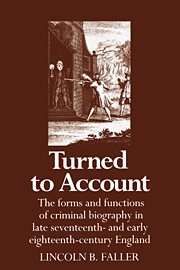 Turned to Account
Turned to Account Book contents
- Frontmatter
- Contents
- Preface
- Part I Turning criminals to account: three case histories and two myths of crime
- Part II Enucleating the truth: the criminal as sinner turned saint
- 3 In the absence of adequate causes: efforts at an etiology of crime
- 4 Heaven seized by sincerity and zeal: justifying God, vindicating man
- 5 Love makes all things easy: recementing the social bond
- Part III Palliating his crimes: the thief as various rogues
- Postscript: Criminal biography and the novel
- Appendix I Who read the popular literature of crime?
- Appendix II The politics of thieving
- Notes
- Select bibliography
- Index
3 - In the absence of adequate causes: efforts at an etiology of crime
Published online by Cambridge University Press: 05 February 2012
- Frontmatter
- Contents
- Preface
- Part I Turning criminals to account: three case histories and two myths of crime
- Part II Enucleating the truth: the criminal as sinner turned saint
- 3 In the absence of adequate causes: efforts at an etiology of crime
- 4 Heaven seized by sincerity and zeal: justifying God, vindicating man
- 5 Love makes all things easy: recementing the social bond
- Part III Palliating his crimes: the thief as various rogues
- Postscript: Criminal biography and the novel
- Appendix I Who read the popular literature of crime?
- Appendix II The politics of thieving
- Notes
- Select bibliography
- Index
Summary
In the politic, as in the natural body, no disorders ever spring up without a cause … and such causes must be adequate to the effects which they produce.
Henry Fielding, Providence in Murder (1752), p. 2It may be now expected that I should give some account what were the Reasons and Motives that instigated me to this Crime. But alas! when I consider the slender Inducements I had thereunto, I must only clap my Hand upon my Breast, and confess it was … my own vile and Corrupted Heart.
Edmund Kirk, Dying Advice (1684)One Sin wilfully committed easily draws on another, and that more; and a Man cannot tell when or where to stop, till it end at last in a sad and shameful Death.
[N.B.], Compleat Tryals (1718, 1721), 3:36The nature of Malefactors is so amply known, I need not much inlarge upon the subject; for why, they are most of them men of leud Conversations … who first most commonly begin with Crimes of a smaller note, and by degrees emboldened in the cursed Trade, they trample upon fear and stifle all remorse; a sympathy so frequently observed in their insolent behaviours, who often have been known, when in their Infancy, to scoff at Admonitions, and make a jest of Piety, but this is only when they are free and unrestrained, roving to and fro…. when they are shackled by justice, and the ends of all their courses come before their Eyes, then they are of other minds.
Execution of 11 Prisoners (1679), pp. 3–4 […]- Type
- Chapter
- Information
- Turned to AccountThe Forms and Functions of Criminal Biography in Late Seventeenth- and Early Eighteenth-Century England, pp. 52 - 71Publisher: Cambridge University PressPrint publication year: 1987
